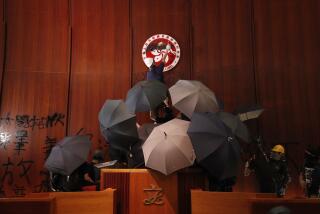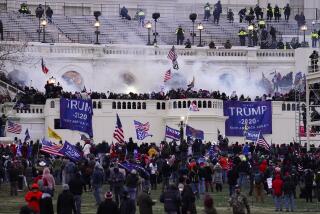Chinese Protest Leaders Get Jail
BEIJING — In a clear warning to proletarian protesters, a Chinese court handed down seven- and four-year prison terms Friday to two men who led some of the largest protests against this country’s industrial sector in years.
A municipal court in the northeastern city of Liaoyang sentenced Yao Fuxin to seven years in prison and Xiao Yunliang to four after they were convicted of attempting to “subvert state power.”
“The court’s verdict basically just repeated the prosecutor’s charges,” said Mo Shaoping, Yao’s Beijing-based lawyer. Both plan to appeal the verdict, he said.
Yao and Xiao were arrested for leading protests in March 2002 by tens of thousands of workers laid off from Liaoyang’s bankrupt Ferro-alloy factory and other state-owned manufacturing facilities. Demonstrators filled the streets of the city and mobbed government offices, demanding unpaid wages, decrying official corruption in the factories and sparking clashes with local authorities.
The sentencing of the two men exemplifies Chinese officials’ formula in recent years for quelling labor unrest: incarcerate protest leaders, fob off demonstrators with concessions, squelch media coverage. The strategy has been largely successful in subduing the despairing workers of northeast China’s industrial rust belt.
Citing the outbreak of severe acute respiratory syndrome, Liaoyang law enforcement officials held Friday’s sentencing at a police detention center surrounded by hundreds of riot police. Mo was unable to represent Yao and Xiao at the sentencing because of SARS-related travel restrictions.
The shackled defendants were not allowed to speak, and the proceedings took about 20 minutes, Yao’s daughter Yao Dan, who was at the sentencing, said by telephone from Liaoyang.
“It’s not us that should be on trial here, but those corrupt officials,” Yao said angrily before the start of the sentencing, according to his daughter.
“He said he had no regrets about his actions,” she added.
Yao, a 52-year-old unemployed steelworker, has been an outspoken labor activist for a decade.
“At his trial in January, we had argued that Yao Fuxin’s behavior fundamentally did not constitute subversion, that he had no intention to subvert state power,” Mo recalled. “At most, it could be argued that he conducted an illegal demonstration, which is what he was charged with when arrested.”
Mo characterized the sentences as being of medium severity. In China, ringleaders of subversive activities can be sentenced to prison terms of 10 years to life, while ordinary participants can get less than three years, he said.
The New York-based group China Labor Watch said that Yao and Xiao’s alleged subversive actions included meeting with “hostile elements and foreign media.”
A veteran of politically sensitive criminal cases, Mo said he was denied access to his client until five days before the trial, and then only within earshot of police. Citing “state secrets,” the prosecution decided what parts of its case it would share with Mo.
Following up on protesters’ accusations, Liaoyang officials have sentenced the manager of the Ferro-alloy factory to 13 years in prison on smuggling charges and have fired the city’s police chief and a Communist Party official, according to China Labor Watch director Li Qiang.
Li said in a statement that Friday’s verdicts were timed to minimize international attention amid the SARS epidemic.
“However, without concrete measures to solve workers’ difficulties and to assure workers’ legal rights, China’s demonstrations will continue,” he said.
More to Read
Sign up for Essential California
The most important California stories and recommendations in your inbox every morning.
You may occasionally receive promotional content from the Los Angeles Times.










